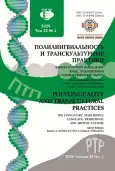Text as a Means of Forming Intercultural Communication in Language Education
- 作者: Volkova T.A.1
-
隶属关系:
- Mari State University
- 期: 卷 22, 编号 1 (2025): THE FINNO-UGRIC MARI PEOPLE: LANGUAGE, TRADITIONAL AND ARTISTIC CULTURE
- 页面: 182-189
- 栏目: Bilingual education
- URL: https://journal-vniispk.ru/2618-897X/article/view/326881
- DOI: https://doi.org/10.22363/2618-897X-2025-22-1-182-189
- EDN: https://elibrary.ru/HWVSMQ
- ID: 326881
如何引用文章
全文:
详细
In the study one of the important problems of the methodology of teaching languages is considered - the formation of intercultural communication. Since the Republic of Mari El is multinational, multicultural, issues of language education are particularly relevant. In this article the analyze of the role of texts in the modern intercultural concept of teaching languages in the educational process is performed. The close connection between language and culture is emphasized, while it is noted that the differences between representatives of different ethnic groups, manifested not only at the level of knowledge/ignorance of the language, but also in other areas, can be overcome by penetrating into the culture of the people. This is not only about teaching foreign languages, but also about teaching the Russian language in the context of multiculturalism and multilingualism, which are most clearly manifested at present in the republic. Particular attention is paid to referring to texts of various types, functional styles when studying the discipline “Russian language and culture of speech”. The article describes ways of referring to the text when studying the topics “Literary norms of the Russian language”, “Functional styles“, “Culture of oral and written business communication”, “Speech etiquette. Ethics of speech communication”, “Stages of preparation and conducting public speeches”, “Culture of discussion and controversy”.
作者简介
Tatiana Volkova
Mari State University
编辑信件的主要联系方式.
Email: tat.volkova2912@gmail.com
ORCID iD: 0000-0003-1630-8635
SPIN 代码: 4440-5521
Researcher ID: F-5138-2014
Candidate of Pedagogical Sciences, Associate Professor of the Department of General Educational Disciplines and Methods of Teaching
1 Lenin Sq, Yoshkar-Ola, 424000, Russian Federation参考
- Text theory. Edited by Yu.N. Zemskaya. 2010. Moscow: Flinta, Nauka publ. EDN: SDQBAL Print. (In Russ.)
- Ruseckaja, O.N. 2011. “Тext as a component of foreign language teaching content.” Vestnik Amurskogo gosudarstvennogo universiteta. Serija. Gumanitarnye nauki, no. 52. 15 Sept. 2024, https://cyberleninka.ru/article/n/tekst-kak-komponent-soderzhaniya-obucheniya-inostrannym-yazykam EDN: PZJLNL (In Russ.).
- Tareva, E.G. et.al. 2020. Intercultural education at the university: linguodidactic strategies and practices. Saint-Petersburg: Nestor-Istorija publ. Print. (In Russ.)
- Arutjunova, N.D. 1999. Language and the human world. Moscow: Languages of Russian culture. EDN: YLAWAR Print. (In Russ.).
- Krasnyh, V.V. 2002. Ethnopsycholinguistics and linguoculturology. Moscow: Gnozis. Print. (In Russ.).
- Ter-Minasova, S.G. 2000. Language and intercultural communication. Moscow: Slovo. EDN: YQOZJO Print. (In Russ.).
- Vereshhagin, E.M., and V.G. Kostomarov. 2005. Language and culture. Three linguistic concepts of foreign studies: lexical background, speech-behavioral tactics, and sapienteme. Moscow: Indrik. EDN: SDWUYH Print. (In Russ.).
- Vezhbickaja, A. 2001. Understanding cultures through keywords. Moscow: Languages of Slavic culture publ. EDN: SUMHVV Print. (In Russ.).
- Sadohin, A.P. 2005. Introduction to the theory of intercultural communication. Moscow: Higher School. EDN: QUBCDR Print. (In Russ.).
- Text as a cultural phenomenon. 1989. Novosibirsk: Science, Siberian Branch. EDN: TTPBAF Print. (In Russ.).
- Vezhbickaja, A. 2011. Semantic universals and basic concepts. Moscow: Languages of Slavic cultures. Print. (In Russ.).
补充文件









